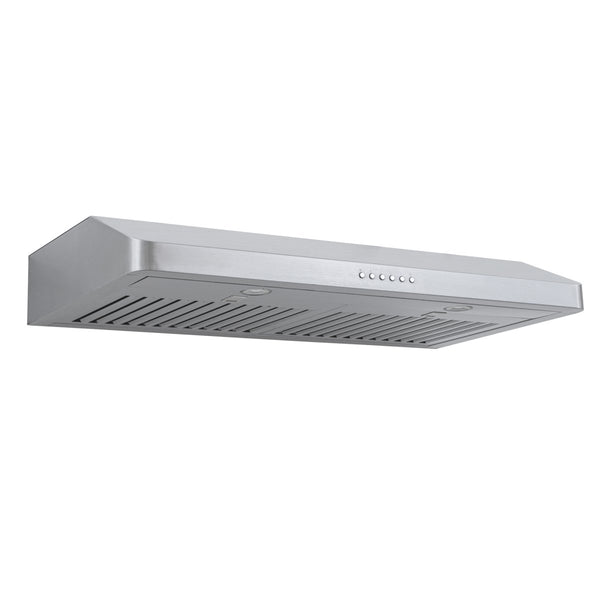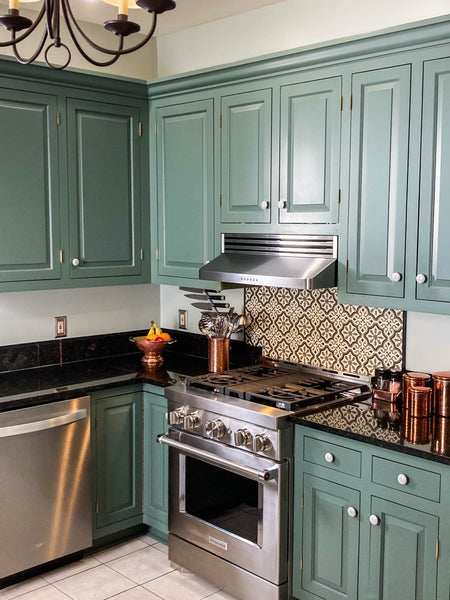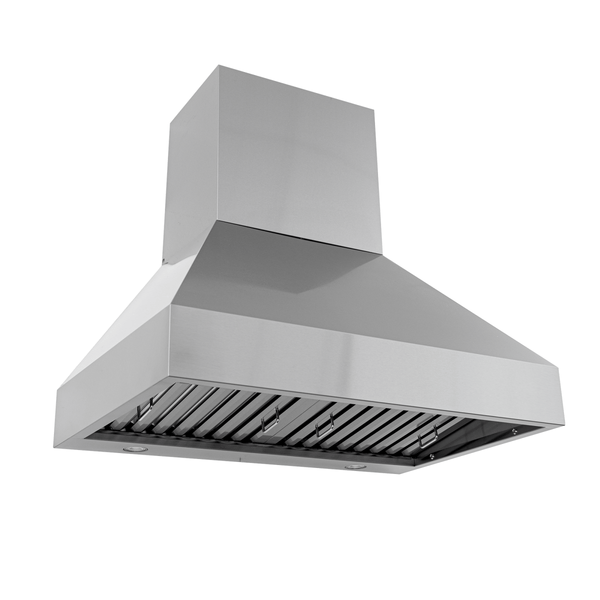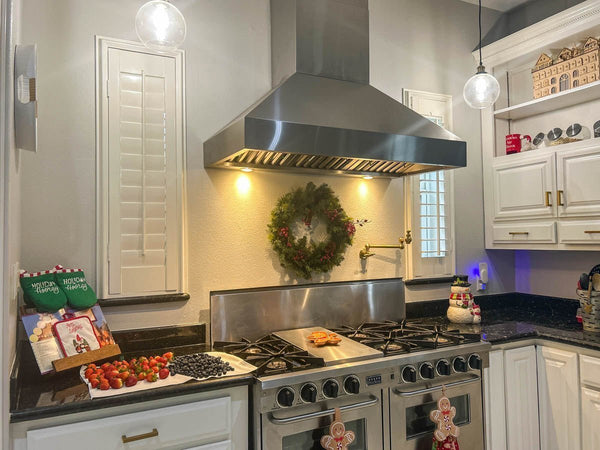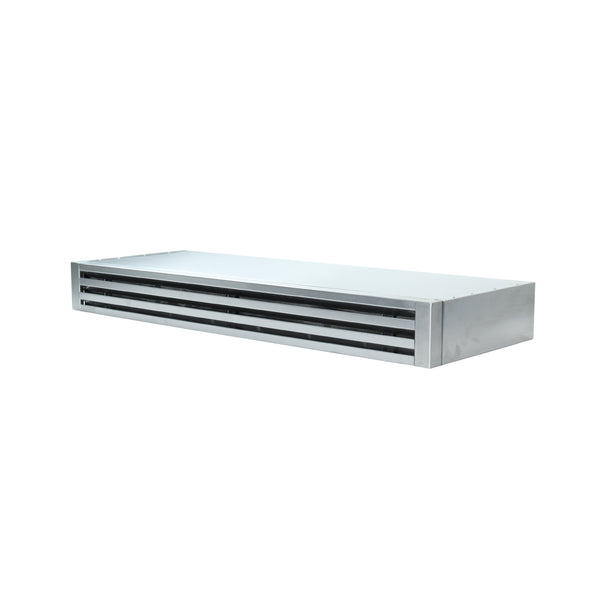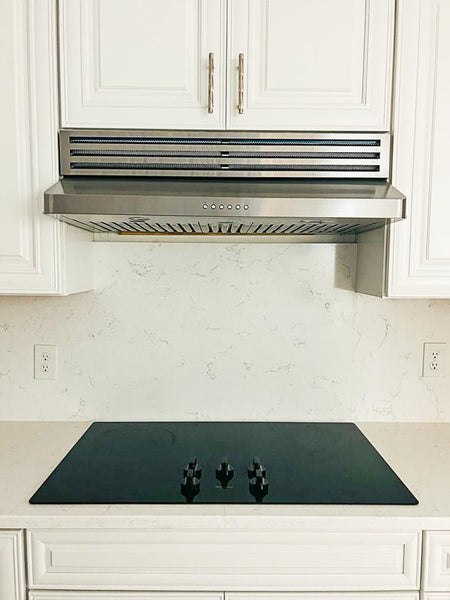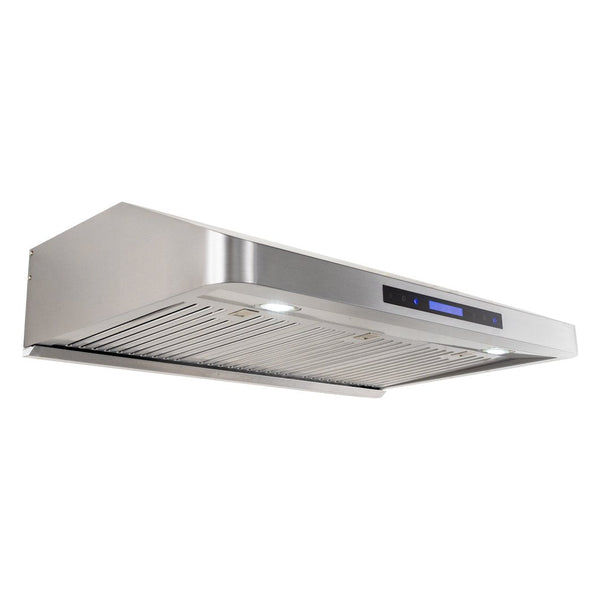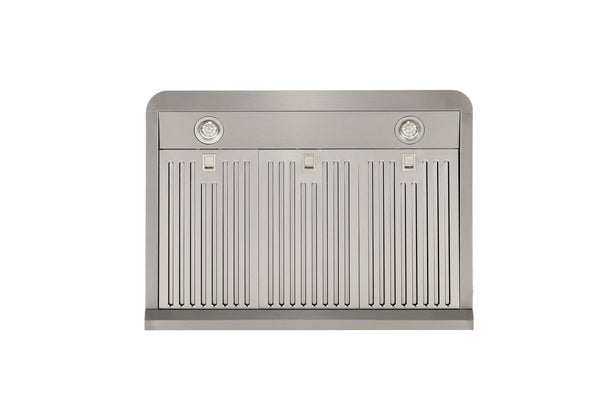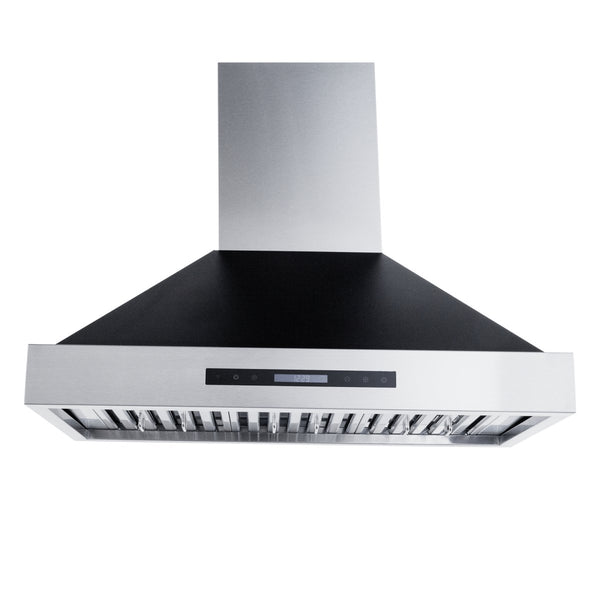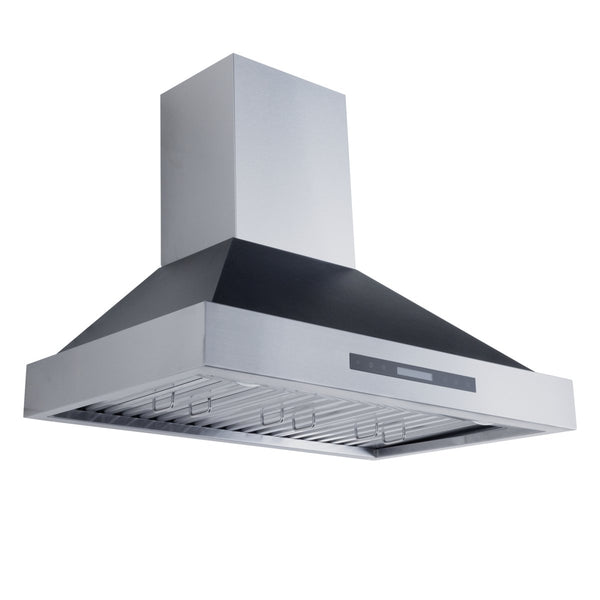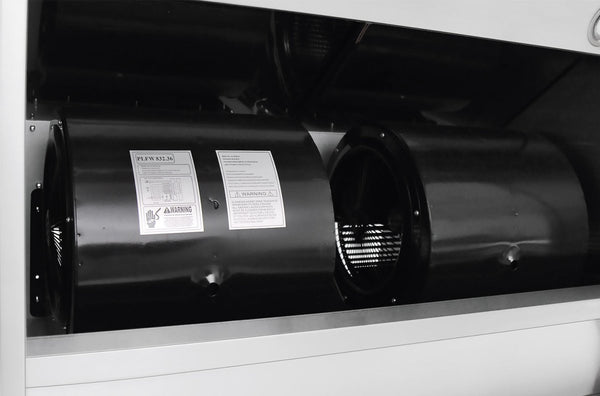Table of Contents
How to Install a Kitchen Vent Hood Insert
Here are four steps on how to install a kitchen vent hood insert:
- Install the adaptor on the back of your vent hood.
- Slide your kitchen vent hood insert into the back of your custom cabinets or custom hood.
- Attach ductwork around the adapter.
- Screw the insert into place.
A kitchen vent hood or range hood insert is a great option for your custom hood. You can design the custom hood however you like and slide the kitchen vent hood insert inside in just a couple of minutes.
Don't Miss These Pro Tips
Our video is meant to be somewhat generic — to apply to anyone who wants to install a kitchen vent hood insert in their home. But if you want to see the insert installation process in action, we thought we would round up a few kitchen vent hood insert and custom hood installation videos and give you our two cents on them. We'll go over their installation process as well.
In the video below, the installers include a great suggestion at the end: to cut out a panel on the side of your hood so that you can access it to tape up the ductwork and do any additional maintenance in the future.
If that will work for you, we recommend doing it. It will save you from having to uninstall the whole thing should you ever need to work on the insert itself or the ductwork. Years down the line, this will make replacement easy too.
Next, you'll want to make sure that all air is properly vented to travel outside your home and that none is escaping into your kitchen.
Also, when installing your kitchen vent hood insert, mount it between 28" and 36" from your cooktop. This will maximize the efficiency of your hood, filtering the right amount of air out of your home...not too much and not too little.
Step-by-Step Installation
In the above video, a couple is installing a vent hood liner from GE Appliances in their kitchen.
Note: In this video, the ductwork includes an elbow directly off the top of the hood. This is not recommended. Instead, allow for at least 18 inches before your first elbow and between any elbowsin your ductwork. This will ensure you don't overwork your hood or have issues moving air efficiently.
Here's a quick overview of their installation process.
- Build the wooden frame.
- Cut a groove into two 2x4 pieces that are the height of the frame and attach them to the frame. These will hold the outer material for your custom hood in place.
- Attach the wood or other material to your custom hood frame.
- Paint your custom hood. This is optional.
Once these steps are done, you've finished your custom hood. Now it's time to install your kitchen vent hood liner or insert.
Note: Inserts and liners are the same, although sometimes called differently by professionals.
Kitchen Vent Hood Inserts Offer the Best in Form and Function
When installing kitchen vent hood inserts, you have nearly unlimited options for design. The walls can be tile, drywall, or finished wood. And you can match that design with your custom hood or go with contrasting styles. At Proline, we've seen some fantastic and unique custom hoods, like this massive metal one below.
Customers have also used inserts to build beautiful custom hoods that integrate seamlessly with their cabinets or walls, like the couple in the video above. Rather than make a strong statement, the insert can be subtle and sleek.
We love the recommendation to seal the ductwork with aluminum tape. It's important that the ductwork is airtight to maximize the efficiency of your kitchen vent hood insert. Great tip!
To set your insert inside the custom hood, you need to do a few things first.
From the outside of your home, cut a hole in the wall for your ductwork. This can be done with a sawzall as shown in the video.
When cutting a hole for your ductwork, be sure to cut the hole about a half-inch larger than your ductwork. For example, if you have 8-inch ductwork, cut a hole that is approximately 8.5 inches in diameter.
If you cut the hole to just 8 inches, it will be difficult to fit the ductwork. On the other hand, you don't want to cut it much larger either.
Second, cut out a final piece of your custom hood material that will go on the underside of your custom hood. Then, cut a hole in this bottom piece large enough so that you can lift your vent hood insert into the custom hood. Secure the wooden slab in place with a nail gun.
Third, lift your insert into the custom hood.
And finally, use some caulking glue to attach the wall cap to the outside of your house.
Over the course of just a couple of days, this couple was able to complete the installation of their kitchen vent hood insert and their custom hood. They loved the result. For a detailed step-by-step guide on the installation, check out their blog.
Building a Custom Kitchen Vent Hood
These next two videos focus on the frame that holds the kitchen vent hood or range hood insert. You can build your custom vent hood either with a custom hood kit or from scratch.
With a Custom Hood Kit
This short video from Lowe's summarizes the custom hood installation process. We'll go over it below.
Steps
- Build the base of your custom hood.
- Cut out two identical side panels — the sides of your custom hood.
- Insert a piece of wood horizontally between the two side panels at the top of the custom hood.
- Build a box for your kitchen vent hood blower. This should fit inside your custom hood frame.
- Create your access panel using the cleats and slats in the custom hood kit.
- Build your mounting frame that will attach to your cabinets.
- Insert the custom hood between your cabinets and secure it in place with screws. Screw into both the mounting frame and your wall for maximum support.
- Install your kitchen vent hood insert. This process will depend on the manufacturer. Refer to their manual for specific instructions.
- Attach the access panel to the front of your vent hood.
For more details on the above process, refer to the above video. Or for a more detailed guide on installing your custom hood like the one shown in the video, click here.
The custom hood in this video replaces the upper cabinets, which is the most popular place for kitchen vent hood inserts. As you build your custom hood, remember to allow for between 28 and 36 inches from your cooktop.
From Scratch
This video details how to build and install your custom hood from scratch. As we did above, we'll outline the steps below.
Steps
- Build the kitchen vent hood insert frame.
- The man in this video used 2x4s and fastened them with screws. His kitchen vent hood insert will hang from the frame. To hang the hood insert, he drilled two screws into the frame and left them sticking out. We recommend that you leave about a quarter-inch of space so your range hood can securely hang on those screws.
- Build the back of your custom hood.
- With this installation, he drilled two 2x4s into the back of the frame. To be safe, he cut part of the 2x4s off at the top to make sure it wouldn't come into contact with his ductwork.
- Attach the custom hood frame to a wall in your garage.
- Install the front 2x4s for your custom hood. This is the same as step 2, but in the front.
- Install support brackets; see the video for details.
- In this video, he installs five support brackets, but even with two, he could support his entire body weight. It's unlikely that you'll need five brackets. You should only need two or three. The most important thing you can do is make sure that you have room for your ductwork to run between the brackets you've installed.
- Install a small frame using three 2x4s at the top of your custom hood. You'll attach the crown molding of your custom hood to this frame when you install it in your kitchen.
4 Pro Tips - Before the Installation
1 - Like in the video, unpack the vent hood insert and put it together as much as possible to use as a reference when building the custom hood. The last thing you want is for the kitchen vent hood insert to not fit inside your new custom hood!
Also, his hood is ducted, so he will need to make sure that the framing accommodates adequate ductwork.
2 - Consider finding a place in your garage or shed to install the range hood insert just like it would be installed in your home. This way, if you make any mistakes the first time through, you can learn them and apply it to the actual permanent installation. This way you won’t need to worry about fixing these mistakes in your kitchen.
3 - Third, you can find a couple of pieces of wood in your garage that you won’t use for your installation, just to use as a reference point or straight edge when making your measurements.
4 - Consider the backsplash material to use in your kitchen. Each backsplash material has a different thickness, which needs to be accounted for during the installation process. His kitchen has subway tile so he accounts for its thickness to make more precise measurements.
Take a look at the fully built frame here.
FAQs
How to Install a Kitchen Vent Hood Vent Through the Ceiling
For island kitchen vent hoods, your ductwork vents through the ceiling and outside your home. Here is a helpful video on how to install your vent through the ceiling.
For a detailed step-by-step guide, click here.
How to Install a Kitchen Vent Hood Through the Wall
The average homeowner can install a kitchen vent hood through the wall in one to two hours. We’ve broken down this process right here in the video below.
To learn more about installing your wall hood, click here.
What is the difference between a kitchen vent hood and a kitchen vent hood insert?
A hood is the entire ventilation system that you mount above your range or grill to clear the air of cooking fumes. An insert is just the guts of the hood (blower, lights, and a control panel) You build the rest custom to fit the design aesthetic of your kitchen.
How deep should a range hood insert be?
To get full coverage a range hood insert should be deep enough that the custom enclosure you are building will reach out from the back of your range to at least the middle of your front burners. The insert without the custom enclosure is usually from 15 inches to 21 inches.
Recap: How to Install a Kitchen Vent Hood Insert
There you have it; two videos on how to install your vent hood insert and two videos on how to install your custom vent hood. If you don’t have the time or tools for the DIY method in the last video, the custom hood kit from Lowes will be less time consuming. Or, call your local kitchen vent hood supplier to discuss custom vent hood options.
For more kitchen vent hood installation tips, check out the articles below.
Related Articles
Don’t Install Your Range Hood Until You Read This Ultimate Guide!
How to Install a Kitchen Vent Hood - Complete Guide
